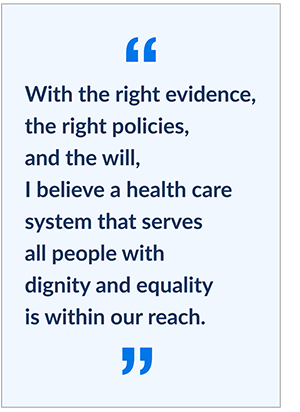Meet the Expert: Adaeze Enekwechi
 As president of IMPAQ, a subsidiary of AIR, Adaeze Enekwechi, Ph.D., M.P.P., leads the strategy and technical oversight of all projects and services across all areas of the company, including health care, workforce development, social programs, and international development. In President Barack Obama’s administration, Adaeze served as associate director for health programs at the White House Office of Management and Budget, where she managed a $1 trillion federal health budget and helped lead the federal response to the Ebola and Zika public heath crises.
As president of IMPAQ, a subsidiary of AIR, Adaeze Enekwechi, Ph.D., M.P.P., leads the strategy and technical oversight of all projects and services across all areas of the company, including health care, workforce development, social programs, and international development. In President Barack Obama’s administration, Adaeze served as associate director for health programs at the White House Office of Management and Budget, where she managed a $1 trillion federal health budget and helped lead the federal response to the Ebola and Zika public heath crises.
POSITION: President, IMPAQ
EXPERTISE: Health Equity and Vulnerable Populations, Medicare, Federal Health Policy
YEARS OF EXPERIENCE: 19
Q: What inspired you to pursue a career in health care, equity, and public service?
Adaeze: I have always been interested in grappling with difficult problems. After graduating college, while working as a budget and policy analyst in the Congressional Budget Office, I became convinced that many of our country’s greatest budgetary issues could be solved if we could get the policies right for our largest expenditures: Medicare, Medicaid, and Social Security.
A common thread among these programs is that they focus on the aging population, many of whom are marginalized and low-income. I realized that I was motivated by health equity and came to see it as the most important and complex problem to solve. With the right evidence, the right policies, and the will, I believe a health care system that serves all people with dignity and equality is within our reach.
Q: How do you see the research and technical assistance of organizations like IMPAQ and AIR contributing to society and health care issues as you just described?
Adaeze: We conduct applied research here at IMPAQ and AIR. All of the questions we grapple with aim to solve a problem or improve a policy affecting the livelihoods of real people. Research-based approaches help policymakers and implementers make sound decisions that help families access quality health care, provide people with job training, and improve educational outcomes. People navigating expensive medical conditions or attending lower-performing schools can’t afford to wait while programs and policies falter. They deserve evidence-based policies that work for them and lift up their communities. At IMPAQ and AIR, we’re proud to be a part of that.
Q: Speaking of applied research, what’s an iconic study that has shaped your thinking on your areas of interest?
 Adaeze: There were many, many researchers whose work helped me sharpen my critical theory of how our health policies are shaped and how we can more effectively disrupt aspects of the system that do not work. The work of David R. Williams helped to build the evidence that race, independent of socioeconomic status, often leads to great stressors and poor treatment, which lead to poor health outcomes. Lisa Cooper’s work on cultural competence and the importance of diversity in our workforce for patients of color had a big impact on me. David Barton Smith’s studies on racial segregation in hospital and nursing home care and the legacy of that history shaped my thinking profoundly at a formative time in my career. Another important piece of work for me was Kevin Schulman’s study, which showed that for women, for Black people, and especially for Black women, clinical recommendations and outcomes were often poor and less likely to meet the standards of care. Different patients presenting with exactly the same symptoms were less likely to be listened to if they were women or people of color.
Adaeze: There were many, many researchers whose work helped me sharpen my critical theory of how our health policies are shaped and how we can more effectively disrupt aspects of the system that do not work. The work of David R. Williams helped to build the evidence that race, independent of socioeconomic status, often leads to great stressors and poor treatment, which lead to poor health outcomes. Lisa Cooper’s work on cultural competence and the importance of diversity in our workforce for patients of color had a big impact on me. David Barton Smith’s studies on racial segregation in hospital and nursing home care and the legacy of that history shaped my thinking profoundly at a formative time in my career. Another important piece of work for me was Kevin Schulman’s study, which showed that for women, for Black people, and especially for Black women, clinical recommendations and outcomes were often poor and less likely to meet the standards of care. Different patients presenting with exactly the same symptoms were less likely to be listened to if they were women or people of color.
These are not comfortable truths, and these incredible studies have shown evidence of health inequities with very little doubt. Having a deep understanding of the troubling history of health and equity in this country fuels my commitment to building a better future. It hasn't left me jaded. It's left me more willing to engage because I know there's so much to do.
Q: We’re hearing more and more about social determinants of health, the idea that various facets of life, like education and housing, have an effect on one’s overall health. Why are these connections important, and how is IMPAQ helping to address them?
Adaeze: There are millions of people who won't see a doctor for fear it will bankrupt their family. This is particularly true now, as we face a global health pandemic. People are struggling with job loss, facing discrimination due to race, sex, or ethnicity, and some are simply born in the “wrong” ZIP code. This all affects health status and access to care. Our health care system alone cannot solve these challenges. We must connect the dots between these disparities and provide a social safety net to ensure everyone can lead a life of dignity with access to high-quality health care.
At IMPAQ, we’re working with the state of Maine to evaluate new state policies and programs designed to ensure that families receiving public assistance do not suffer worse health outcomes when their income rises and they no longer qualify for public support. We also provide technical assistance to support the Centers for Medicare & Medicaid Services in improving health care quality and access for people with chronic kidney and end stage renal diseases, which have disproportionate effects on communities of color, especially poor people, with devastating health consequences.
We provide operational support that helps people access health insurance through the federal and state marketplaces that were created under the Affordable Care Act, a necessity many families are facing in the current economic crises with millions losing their jobs and employer-based coverage. While operational support may sound mundane, effective operation of these public programs means the difference between life and death for many people.
Q: You’ve written about implicit bias within health care delivery in the journal Health Affairs and have spoken out on how diseases like COVID-19 exacerbate existing racial health care disparities. What are some research-based ways to address long-standing racial injustices in health care?
Learn More about Adaeze
Pre-pandemic, where could we find you on a typical Saturday?Saturday is a day I try to relax and do things that matter to me personally. I’d start my day in a park walking or hiking, then a coffee shop, where I always aim to try something that sounds fancy but I’m never brave enough, and ultimately settle for a small regular coffee. I would also meet up with my book club or with my sorority, Alpha Kappa Alpha, to raise money or do community service in Montgomery County, Maryland.
Adaeze: We have an empathy gap in this country. When minorities or other marginalized groups encounter the medical system, they sometimes report a negative experience due to a lack of empathy from providers. We can do an excellent job increasing access to care, but if that care leaves a person feeling mistreated or ignored, we are still failing.
There is evidence that shows a more diverse health care workforce means more people could access clinicians who listen to their concerns, treat them with respect, and understand their communities. There's also evidence demonstrating that cultural competence and implicit bias training has a significant and positive impact on how clinicians engage with diverse populations.
Another important solution policymakers and health care providers are exploring is directing resources away from medical interventions. Many people with chronic conditions have limited access to nutritious food and safe neighborhoods, as well as a lack of awareness and proper education about health. How might we redirect resources to address those stressors? The evidence for these types of interventions is growing—and now is the time to take the leap and start to scale them.
Q: What book do wish everyone would read to better understand the roots and history of these long-standing health inequities?
Adaeze: The Warmth of Other Suns by Isabel Wilkerson. This book shares one of the greatest stories in American history that we don’t often hear about. It covers the Great Migration through the lens of three people as they pursue economic opportunity away from the South during the Jim Crow Era. It will give you a better perspective of why things are the way they are in this country, such as how cities became segregated and why some communities still live in poverty. Unfortunately, much of this was by design. Understanding our country’s history has helped me take a critical lens to assumptions made in health care and beyond. I wish everyone would read this book because African American history is American history.